TopPop
TopPop is the first regular dedicated pop music television series in the Dutch language area. The Netherlands broadcaster AVRO aired the programme weekly, from 22 September 1970, to 27 June 1988.[1] Presenter Ad Visser hosted for its first fifteen years. The creator and original director of TopPop was Rien van Wijk. Many other directors followed: Egbert van Hees, Geert Popma, Henk Renou, Chris Berger, Jessy Winkelman, Wim van der Linden, Bert van der Veer and Charly Noise. Although TopPop was inspired by British music programme Top of the Pops, it had its own character.
| TopPop | |
|---|---|
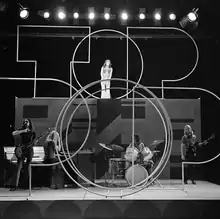 Earth and Fire on the TopPop stage | |
| Created by | Rien van Wijk |
| Based on | Top of the Pops by Johnnie Stewart |
| Country of origin | Netherlands |
| Release | |
| Original network | AVRO |
| Original release | 22 September 1970 – 27 June 1988 |
| Related | |
| Top of the Pops | |
Description
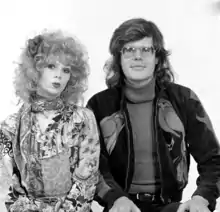
The main approach was to let music artists mime to their latest hit record in the TopPop studio. However, most music acts in the Dutch pop charts were foreign to the Netherlands, and frequently not available for a performance in the studio. If this was the case, it was sometimes possible for the TopPop camera crew to meet the artist at another location. Consequently, artists were filmed around the world, including Tom Browne in a studio in New York City, David Cassidy at the airport in Schiphol, and Barry White at his home in Los Angeles. If there was no way to feature the artists on TopPop, their promo video would be played - if one existed, since prior to the 1980s these were not routinely created. If all else failed, there was a fourth option that the programme frequently had to resort to: hit songs were played to a dance routine by dancer and choreographer Penney de Jager and her troupe. When music videos became more common on television, the popularity of TopPop decreased and the programme was stopped in 1988. TopPop was chosen as the programme of the century in a poll in 2000 by Televizier.
For many Dutch and Flemish viewers, TopPop was the primary source of information about pop music. TopPop compiled its own hit chart, based on viewers' top-ten lists, sent in on postcards, from 1970 to 1974, from 1978 to 1982 and from 23 February 1986 to 10 July 1988. However, it used the Dutch National Hitparade, a sales-based list, from 1974 to 1978 and from 1982 to 1986.
In the last programme of each year, the annual complete Top 10 was broadcast. There were performances by studio guests, and there were polls among viewers on the most popular artist, group and DJ. Looking back on the year 1976, Ad Visser and Krijn Torringa were sitting behind a desk in an office which made it a parody of Van Oekel's Discohoek. This absurd programme was itself a parody of TopPop.
Notable performances include one in 1977, by Iggy Pop, who refused to leave his dressing room and then, during a rehearsal, stormed dramatically and unexpectedly onto the studio floor. He spent most of the song writhing on the floor without a shirt on, miming his hit single and destroying some plants that had been put on the floor as decoration. For many young viewers in the Netherlands, this was their first encounter with punk rock.[2]
Some TopPop-made videos were of such quality, the performing artist chose to use it as their promotional video. Examples are the 1974 sequence of an eye-patched David Bowie miming to "Rebel Rebel", and Nena walking through a wood-cuttery at Crailoo near Hilversum, imagining a post-war devastated area fit for the Cold War atmosphere of her 1983 hit "99 Red Balloons".[3]
The famous archive of performances can be viewed online.[4]
_-_TopPop_1972_1.png.webp) America (1972)
America (1972)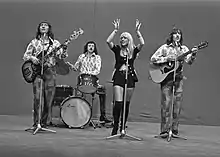 Middle of the Road (1972)
Middle of the Road (1972) Fairport Convention (1972)
Fairport Convention (1972) ABBA (TopPop 1974)
ABBA (TopPop 1974)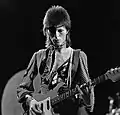 David Bowie (1974)
David Bowie (1974)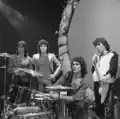 Golden Earring (1974)
Golden Earring (1974)
Selected list of performers
- 10cc
- ABBA
- ABC
- AC/DC
- Ace
- Alphaville
- Adam Ant
- Amanda Lear
- America
- Afric Simone
- Apollonia 6
- Ashford & Simpson
- Rick Astley
- Charles Aznavour
- Aztec Camera
- The B52s
- Bananarama
- The Bangles
- John Barry
- The Beat
- Bee Gees
- Pat Benatar
- Plastic Bertrand
- Black Sabbath
- Blondie
- Michael Bolton
- Boney M.
- The Boomtown Rats
- David Bowie
- Bow Wow Wow
- Jacques Brel
- James Brown
- Bucks Fizz
- Rocky Burnette
- Kate Bush
- BZN
- The Carpenters
- Ray Charles
- Chas & Dave
- Cheap Trick
- Chic
- The Christians
- Jimmy Cliff
- Joe Cocker
- Commodores
- Ry Cooder
- Elvis Costello
- Kevin Coyne
- Randy Crawford
- The Cure
- Dead or Alive
- Culture Club
- Cutting Crew
- Deacon Blue
- Kiki Dee
- Dalida
- Def Leppard
- John Denver
- Dire Straits
- Divine
- Doe Maar
- Lonnie Donegan
- Doobie Brothers
- Dr. Hook & the Medicine Show
- Duran Duran
- Ian Dury and The Blockheads
- Sheila E.
- Sheena Easton
- Electric Light Orchestra
- Brian Eno
- Erasure
- Europe
- Marianne Faithfull
- Falco
- Fatback Band
- Focus
- Foreigner
- Four Tops
- Samantha Fox
- Peter Frampton
- Gloria Gaynor
- Genesis
- George Baker Selection
- The Go-Go's
- Golden Earring
- Rupert Holmes
- Grandmaster Flash and the Furious Five
- Eddy Grant
- Gruppo Sportivo
- The Guess Who
- Bill Haley & His Comets
- Hall & Oates
- Emmylou Harris
- Heart
- Marcia Hines
- The Hollies
- Bruce Hornsby & The Range
- Hot Chocolate
- The Housemartins
- Whitney Houston
- The Human League
- The Icicle Works
- Julio Iglesias
- INXS
- It's Immaterial
- The J. Geils Band
- The Jacksons
- Janet Jackson
- Jermaine Jackson
- Joe Jackson
- La Toya Jackson
- The Jam
- Rick James
- Japan
- Jean-Michel Jarre
- Joan Jett & the Blackhearts
- Elton John
- Johnny Hates Jazz
- Grace Jones
- Howard Jones
- Tom Jones
- KC and the Sunshine Band
- Kiss
- Chaka Khan
- Gladys Knight & the Pips
- Kool & the Gang
- Labelle
- Patti LaBelle
- Cyndi Lauper
- Level 42
- Jona Lewie
- Limahl
- Nick Lowe
- Phil Lynott
- Madness
- Madonna
- Manfred Mann
- Bob Marley & The Wailers
- Don McLean
- Meat Loaf
- John Cougar Mellencamp
- John Miles
- Mink DeVille
- The Modern Lovers
- Eddie Money
- Gary Moore
- Giorgio Moroder
- Nana Mouskouri
- Nazareth
- Nena
- Robbie Nevil
- New Musik
- Randy Newman
- Nits
- Gilbert O'Sullivan
- Billy Ocean
- Roy Orbison
- Orchestral Manoeuvres in the Dark
- Robert Palmer
- Graham Parker & The Rumour
- The Pebbles
- The Pointer Sisters
- The Police
- Iggy Pop
- Prefab Sprout
- Billy Preston
- The Pretenders
- The Primitives
- The Proclaimers
- Procol Harum
- Queen
- Gerry Rafferty
- Ramones
- Johnnie Ray
- Chris Rea
- Redbone
- Cliff Richard
- Smokey Robinson
- The Romantics
- Linda Ronstadt
- Demis Roussos
- Roxy Music
- The Runaways
- Sad Café
- Sade
- Sandra Lauer
- Seal
- The Brothers Johnson
- The Selecter
- The Shadows
- Shalamar
- Del Shannon
- Feargal Sharkey
- Simply Red
- Joyce Sims
- Siouxsie and the Banshees
- Sister Sledge
- Slade
- Percy Sledge
- Grace Slick
- Soft Cell
- Spagna
- Spandau Ballet
- Sparks
- The Specials
- Split Enz
- Squeeze
- Stars on 45
- Status Quo
- Steve Harley & Cockney Rebel
- Al Stewart
- Rod Stewart
- The Stranglers
- Stray Cats
- The Style Council
- The Sugarhill Gang
- Donna Summer
- Supertramp
- Patrick Swayze
- The Sweet
- Swing Out Sister
- Talk Talk
- Tavares
- Tears for Fears
- The The
- Toots Thielemans
- Thin Lizzy
- Thompson Twins
- Tom Robinson Band
- The Trammps
- Tubeway Army
- Bonnie Tyler
- UB40
- Uriah Heep
- Vanity 6
- Gino Vannelli
- Village People
- Visage
- Wang Chung
- Dionne Warwick
- Barry White
- Kim Wilde
- Matthew Wilder
- Steve Winwood
- Wayne Wade
- Wizzard
- Womack & Womack
- Syreeta Wright
- XTC
- Paul Young
- Matia Bazar
References
- "Entry at wilde-life.com".
- Roos, Mark (3 August 2015). "Iggy Pop shockeert Toppop". Algemeen Dagblad (in Dutch). Retrieved 15 January 2016.
- In the Netherlands the original German-language version of the song, "99 Luftballons", was Nena's debut hit, charting at number one in March/April 1983.
- "TopPop". YouTube.